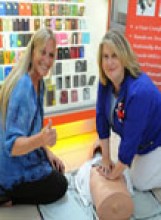How to Care for a Nosebleed
ByAs summer approaches and the air becomes drier and looses it’s humidity, more people suffer from nosebleeds, especially children. Nosebleeds are a common occurrence. Most often they are a simple nuisance and not a true medical problem.
To care of a nosebleed:
- Sit upright and lean forward. By remaining upright, you reduce blood pressure in the veins of your nose. This discourages further bleeding. Sitting forward will help you avoid swallowing blood, which can irritate your stomach.
- Pinch your nose. Use your thumb and index finger and pinch on the bony part of your nose, just above the flexible cartilage. Continue to pinch for up to 10 minutes.
- Ice, the side of your neck. Many of the blood vessels that support the face come up from the side of your neck. Cooling the blood thickens it and helps in the clotting process.
- Pressure Point. Another alternative is to apply pressure under the front lip. Use a rolled up tissue or gauze pad.
- To prevent re-bleeding after bleeding has stopped, don’t pick or blow your nose and don’t bend down until several hours after the bleeding episode. Keep your head higher than the level of your heart.
If re-bleeding occurs, blow out forcefully to clear your nose of blood clots and spray both sides of your nose with a decongestant nasal spray containing oxymetazoline (Afrin, Neo-Synephrine, others). Pinch your nose in the technique described above and call your doctor.
Seek medical care immediately if:
- The bleeding lasts for more than 20 minutes
- The nosebleed follows an accident, such as a
 fall or an injury to your head, including a punch in the face that may have broken your nose
fall or an injury to your head, including a punch in the face that may have broken your nose
For frequent nosebleeds:
If you experience frequent nosebleeds, make an appointment with your doctor. You may need to have the blood vessel that’s causing your problem cauterized. Cautery is a technique in which the blood vessel is burned with electric current, silver nitrate or a laser. Also coating the front inner portion of the nose with Vaseline, first thing in the morning and at night, has proven to help reduce nosebleeds for many people with recurrent nosebleeds especially due to dry air or temperature changes. Call your doctor if you are experiencing nasal bleeding and are taking blood thinners, such as aspirin or warfarin (Coumadin). Your doctor may advise adjusting your medication intake.







